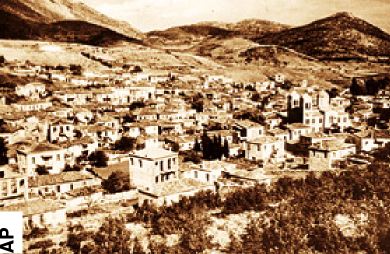 |
||
|
Greek Relatives of Nazi Victims Score a Win in Italy Over Reparations |
||
|
ROME RELATIVES of Greek civilians killed by Nazi forces during World War II have won a victory in their decade-long battle to force Germany to pay reparations, successfully bringing their case to Italy and making a legal claim on a German-owned villa near Lake Como. Last week, lawyers for the Greek victims took out a mortgage lien - a legal claim against a mortgaged property - on Villa Vigoni, a 19th century estate that is owned by the German government and used as an Italian-German cultural centre, the victims' lawyers and German officials said. |
 The Greek village of Distomo, where a 1944 Nazi massacre took place, is seen in this undated file |
|
|
The lawyers acted after a court in Florence ruled that a 1997 decision by a Greek court awarding relatives of the victims 9.4bn drachmas (about $25m) could be executed in Italy.
The German government has appealed the case to Italy's highest court, the Court of Cassation, and expects the judgement to be thrown out. But in Italy, such sentences are enforceable pending appeals. That means that until the high court rules, the relatives of the victims can secure the debt owed them by taking out the mortgage lien against German property in Italy, including Villa Vigoni, said Stefano Burzzone, an official in the German foreign ministry who has been handling the matter. The case involves relatives of 214 civilians executed by Nazi troops on 10 June 1944 in the central Greek village of Distomo. Tens of thousands of civilians were executed during the 1941-44 Nazi occupation of Greece as part of a brutal campaign to suppress resistance fighters. The Distomo killings, though, have been seen in Greece as one of the worst Nazi atrocities committed in the country. In 2000, Greece's Supreme Court upheld the 1997 ruling by the court in Levadia which originally awarded the 9.4bn drachmas ($25 million) as compensation. The Greek government, though, refused to approve the sale of German state properties to execute the sentence, saying it could harm relations with Germany. And in 2002, the Special Supreme Court - Greece's highest court - ruled that the relatives of victims could not sue Germany for reparations through Greek courts. Germany never accepted the Levadia verdict, saying the case violated the principle of state immunity. Germany also insisted the claims were covered by the 115m marks ($56m) it paid to Greece in the 1960s to compensate victims of the Nazi occupation. The Levadia sentence remained on the books, however. After the Greek judgements blocked any seizure of German assets in Greece, relatives of the victims tried to execute the sentence elsewhere, including in Belgium and Italy, Burzzone said. The Belgian court rejected the claim, arguing that it could not recognise a sentence of a foreign country that was not enforceable in that country, he said. An appeal is pending. In Italy, though, the Florence court accepted the case and ruled in favour of the victims. In their arguments before the Florence court, the Distomo relatives successfully cited a 2004 Italian high court ruling that said that state immunity does not apply when war crimes are committed. The lien they secured does not mean that Villa Vigoni is going to be sold off anytime soon, said Joachim Lau, the Italy-based lawyer who is representing the victims here. It merely means that the German government would have to ask permission of the Distomo relatives if it were to sell it - a ploy the relatives are hoping will compel the government to reach a settlement, Lau said. Lau has estimated that the original Levadia sentence was now worth 62m ($82m), with interest. Burzzone ruled out any settlement, saying there were simply too many potential claimants. He predicted that eventually the Cassation court would rule in Germany's favour, by reaffirming that state immunity applies and that the Greek sentence cannot be executed here. "As long as the court cases go on, there is no reason to settle," he said. Mark Stephens, a London-based international lawyer with Finers Stephens Innocent, said eventually the Germans may have to pay. "Compensation for war crimes trumps comity between nations," he said. "We are now at a point where we bring people to account for war crimes. And there are no statute of limitations for war crimes because they are beyond the pale." At Villa Vigoni, meanwhile, life continues as usual. "I can assure you that at Villa Vigoni, no one (from the police) has arrived," said Aldo Venturelli, the centre's secretary general. "Our activities continue." |
||
|
|
||
|
|
||
|
|
||
(Posting date 2007)
All articles of Athens News appearing on HCS have been reprinted with permission. |
||
|
||
|
2000 © Hellenic Communication Service, L.L.C. All Rights Reserved. http://www.HellenicComServe.com |
||

